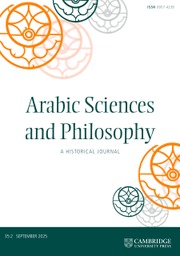No CrossRef data available.
Article contents
CROSS-REFERENCE BETWEEN LOGIC AND PSYCHOLOGY IN IBN SĪNĀ’S THEORY OF EXPERIENCE (TAǦRIBA)
Published online by Cambridge University Press: 09 August 2023
Résumé
Cet article démontre que la théorie de l’expérience (taǧriba) d’Ibn Sīnā nécessite une référence croisée entre la logique et la psychologie. Suivant la tradition linguistique basrane, il paraphrase les noms dérivés (ism muštaqq) dans la formule li-x y (« y appartient à x ») : par exemple, ʿālim (« savoir ») est paraphrasé en lahu ʿilm (« un acte de savoir lui appartient »). Sa théorie de l’expérience emploie cette formule pour arranger les phénomènes observés dans une certaine forme de syllogisme et décrire les fonctions des sens internes du cerveau. Ibn Sīnā arrange les phénomènes observés dans la formule li-x y ou la proposition dont un prédicat est un nom dérivé de y. En même temps, il soutient que le sens du souvenir est impliqué dans le processus de l’expérience. Le souvenir est un sens interne du cerveau, qui préserve maʿnā perçue par le sens de l’estimation. L’estimation consiste à percevoir maʿnā (y) qui est inhérente à un sujet (x), et à porter un jugement sur x en fonction de y. Ainsi, dans ce processus, l’analyse des noms dérivés range les phénomènes observés dans un ordre rationnel, et le sens interne établit la causalité entre l’appréhension et l’affirmation logique. L’article se termine par une discussion sur la relation de cette philosophie avec la médecine.
Abstract
This article demonstrates that Ibn Sīnā’s theory of experience (taǧriba) requires a cross-reference between logic and psychology. Following the Basran linguistic tradition, he paraphrases derived names (ism muštaqq) into the li-x y formula: for example, ʿālim (“knowing”) is paraphrased into lahu ʿilm (“an act of knowing belongs to him”). His theory of experience employs this formula for arranging observed phenomena into a certain form of a syllogism and describing functions of the brain’s inner senses. Ibn Sīnā arranges observed phenomenon into the li-x y formula or the proposition of which a predicate is a derived name of y. Meanwhile, he holds that the sense of recollection is involved in the process of experience. Recollection is an inner sense of the brain, which preserves maʿnā perceived by the sense of estimation. Estimation means to perceive maʿnā (y) that inheres in a subject (x), and to make a judgment about x based on y. Thus, in this process, the analysis of derived names arranges observed phenomena into a rational order, and the inner sense establishes the causation between apprehension and logical assertion. The article concludes by discussing the relation of this philosophy to medicine.
- Type
- Research Article
- Information
- Copyright
- Copyright © The Author(s), 2023. Published by Cambridge University Press




